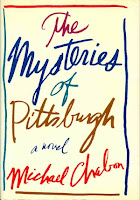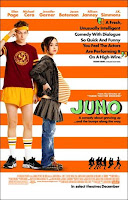
I finally made my way around to reading Michael Chabon's 1988 novel "The Mysteries of Pittsburgh." I had tried reading through this book a few years ago, but got bogged down about halfway into it and distracted by other things, and eventually it made its way back on to my shelf. I picked it up again (literally) a few months ago, and put it in my car with every intention of reading it, but but before I could read it, it got buried under the myriad and sundry things that eventually end up in the backseat of every car. Finally, it was discovered and I committed myself to getting all the way through it. (But enough about that...)
The book covers one summer in the life of Arthur Bechstein, as he discovers new friends and lovers in the college areas of Pittsburgh. Jobless and aimless and recently graduated, he gets caught up in a whirlwind of activity surrounding his new friends. Although he falls madly in love with the exotic librarian Phlox, he also struggles with homosexual feelings for his best friend, Arthur Lecomte. Bechstein bounces between the two lovers through most of the novel. Meanwhile, he is also trying to keep his past - specifically his mobster father - away from his newly developing personal life. But, when Cleveland - one of the new friends - forces Bechstein to introduce him to his father, things begin to sour on every front. Phlox and Lecomte force Bechstein to choose between the two of them, and Cleveland gets caught up too heavily in the mob scene and meets a tragic end. In the end, we learn that Bechstein chooses Lecomte and they move to Europe, although it is also revealed that Lecomte leaves him there and the novel ends with Bechstein reflecting upon his abandoned relationship with Phlox and what might have been.
"The Mysteries of Pittsburgh" was the first novel that Chabon read, and that becomes painfully obvious while reading. The voice and tone of the novel is unrefined and seems to change regularly, as though Chabon wasn't quite sure where he was going from chapter to chapter. He relies too heavily on archetype to create his characters: Phlox - the exotic woman; Lecomte - the forbidden lover; Cleveland - the rugged man; Jane - the ideal upper-class beauty. Cleveland's dramatic death represents the climax of the plot, somehow, even though he was only a slightly-higher-than-minor character throughout the book - rather than the climax being Bechstein's choice between Phlox and Lecomte, which the entire book was building towards but ends up being delegated to a few sentences in the resolution. There are also moments of beautiful metaphor and description that do not seem to add to the novel in any way except that, well, they're the type of thing a novel is supposed to have and so they were thrown in to the book.
Of course, part of the reason I blast "The Mysteries of Pittsburgh" here is out of jealousy. The book is better, by far, than anything I could ever write (me being the same age now as Chabon was when it was published). Clearly, Chabon is setting the stage for his later great writings involving similar situations - the ensemble cast in "Wonder Boys" (one of my personal favorite books of all time) and the love triangle in "The Amazing Adventures of Kavalier and Clay" (although that was a minor subplot).
Like a teenager shaving with a straight blade for the first time who nicks himself several times in the process, "The Mysteries of Pittsburgh" isn't perfect, but it marks the beginning of an already great career, highlighted by a Pulitzer Prize honor, but not yet punctuated. (And with that poor imitation of a Chabon metaphor, this post is over.)


